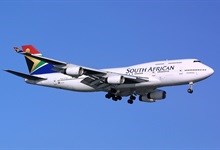Restructuring plan
In the European Union, government guarantees are seen as part of state aid. A restructuring plan is required before an airline receives a guarantee to show it can become viable within a set period. In October 2012, the government gave SAA a R5bn guarantee for a period of two years. SAA stated at the time that it needed between R4bn and R6bn for a recapitalisation programme. One of the conditions for the R5bn guarantee in 2012 was that SAA's board had to develop a turn-around strategy.

In October 2014, SAA was again seeking government support, two years after it was granted the R5bn in loan guarantees. In January 2015, Finance Minister Nhlanhla Nene announced that SAA will receive yet another R6.5bn injection. To date, SAA has received more than R30bn in government guarantees and loans from the state since 1999. Therefore, it's not rocket science to see that SAA is struggling to stay in business and its strategies have failed timeously.
It is only justified for Comair to take the matter to court, after seeing SAA's former competitors who merely could not survive the competition with the national carrier, companies such as Flitestar, SunAir and Nationwide. SAA remains to have the unfair competitive advantage, by having state aid as its support base, sadly at the tax payer's expense. For a moment, can we consider looking at SAA with a pair of fresh eyes, not only does it carry the South African flag, giving every South African a sense of patriotism and belonging. It's a brand that no one would like to see disappear, fall by the wayside and go into liquidity. It would be a very tragic ending.
The envitable fate for the Proudly South Africa national carrier to be privatised has been discussed many a times with no conclusive decision being made. In April 2015, we have also witnessed Skywise, a new entrant to the domestic aviation market, who called for the government to remove SAA from the domestic market and leave it to the private sector. This seems to be the only solution for a company that is in ruin. It is also common business knowledge that companies also want to invest in businesses that are doing well.
Any sound investment strategy is based upon buying well-run, good companies and expecting the growth in earnings. So where does this leave SAA? Not neglecting the controversial shame of scandalous executive management at the helm of the company which has slanted the reputation of the company, coupled with previous anti-competitive practices and racial allegations which left a sombre air about the aviation company. There is never a perfect company in a realistic world, and yet it's not easy to dismiss SAA, there is so much that makes it a sentimental brand, a symbol of the rainbow nation and rich history. SAA provides jobs to thousands of people for an eighty year old company which started with only forty staff members.
SAA is an African pearl, that has been providing nonstop flights to the fastest growing economies in the world, such as Beijing and Mumbai, but later due to financial strain had to cut some of these as part of its turnaround strategy to recover costs. Recently it has started providing direct flights to Dubai, and continues to promote both trade and tourism.
In 2014, South African Airways (SAA) has been voted the best airline in Africa for the 12th year in a row by UK global aviation research organisation, Skytrax, where, over 18-million businesses and leisure air travellers from 100 countries were polled by telephone, questionnaires and online. The survey covered over 200 airlines, from the largest international airlines to the smallest domestic airlines. The airline also won the Best Staff Service in Africa award, three times in a row.
It is our government that holds the keys, and set the rules for the aviation industry in the Domestic Aviation Transport Policy, the SAA Act, the Promotion of Administrative Justice Act, the Public Finance Management Act and the Constitution, but is questioned for the complying with the regulations. It will be interesting to see how the matter will play out in court. My vote is still flying with SAA.
*Note that Bizcommunity staff and management do not necessarily share the views of its contributors - the opinions and statements expressed herein are solely those of the author.*